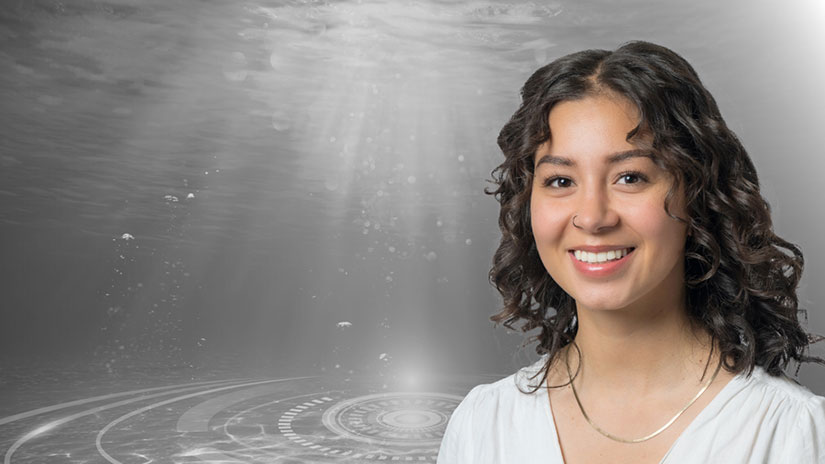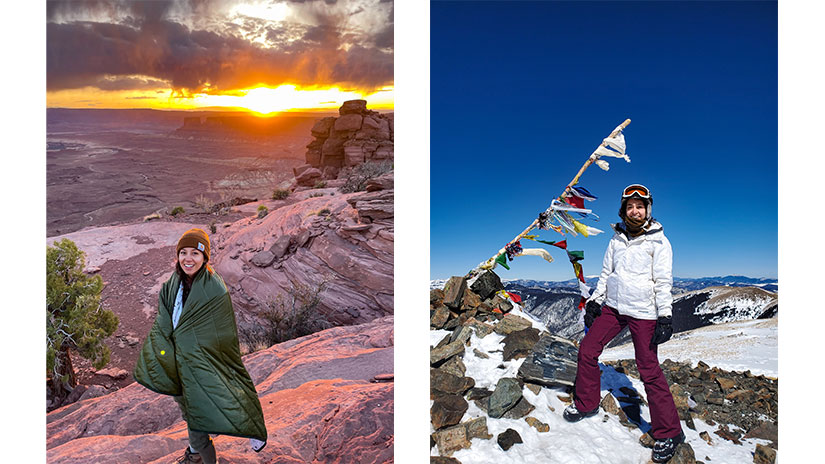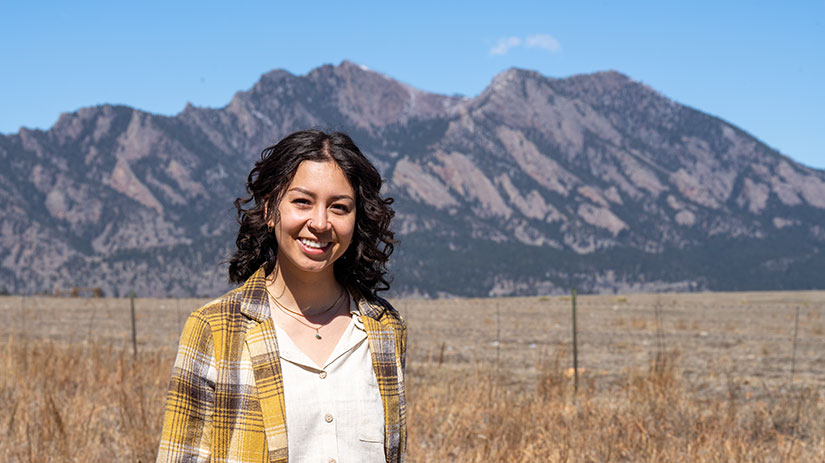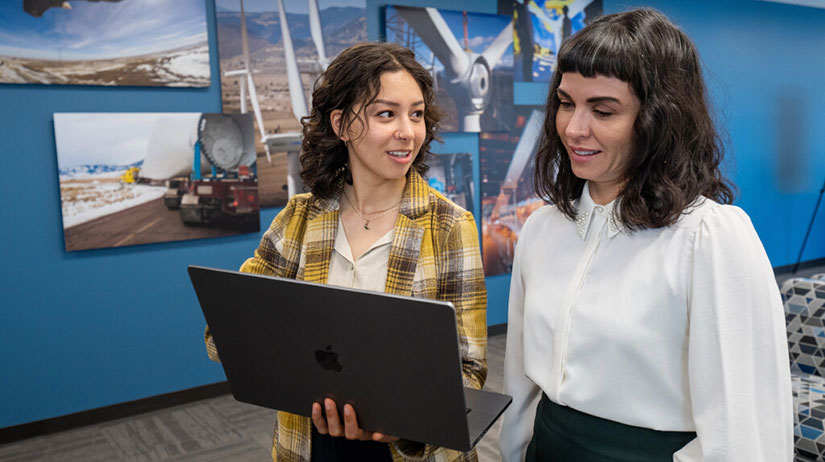Beneath the Surface: How a High School Essay Steered Tina Ortega Toward a Career in Marine Energy
Marine Energy Research Engineer Remembers the Moment Her Holiday Frustration Turned Into A Clean-Powered-Inspiration

When Tina Ortega was a senior in high school, her physics teacher assigned her class a nine-page essay the day before Thanksgiving break started. The due date? The day before classes resumed.
“We had to work on it all break,” recalled Ortega. “We were all very, very angry about it.”
However, the assignment had an upside. It revealed a career path that Ortega still walks.
“The assignment was to describe the different types of energy sources that are used in America,” Ortega explained. “Energy sources like coal, natural gas, wind, solar, all these different kinds of energy. Then we had to discuss why we thought certain types of energy were used more than others. It made me stop and think, ‘Why are we still using finite energy sources that pollute the air when we have renewable energy sources that don’t?’”
For as long as she could remember, Ortega felt a deep connection to the natural world. Growing up in the Northern California city of Red Bluff, she would often swim in Whiskeytown Lake, hike Mount Lassen and Mount Shasta, take walks along the Sacramento River, and camp in Redwood National Park to recharge and marvel at nature’s vastness and beauty.

Tina Ortega’s connection to and reverence for the natural world inspired her to seek out a career that would help protect the environment. Photos by Tina Ortega, NREL
“As I got older, I learned about climate change and all the human activities that impact the environment,” Ortega said. “That knowledge, along with what I learned from that Thanksgiving break assignment, made me want to find a career that would help protect the environment.”
Ortega took that desire with her when she began her undergraduate studies at Humboldt State University (now California State Polytechnic University, Humboldt).
“I was good at math, so I majored in environmental resources engineering,” Ortega said. “Within that major, I learned more about renewable energy and thought that was the best way for me to apply my skills and also do my part to save the world.”
Then, in 2018, when Ortega was in her fourth year of college, the Camp Fire destroyed the town of Paradise—only an hour’s drive from Ortega’s hometown, and where most of Ortega’s family lived.
“All my family in Paradise lost their homes,” Ortega recalled. “And even though a faulty transmission line was the official cause of the fire, we also know that climate change causes hotter temperatures, which causes drier conditions, which significantly increases the risks and severity of wildfires. You could say the experience sparked my determination to do anything I can to prevent a disaster like that from happening again.”
Ortega carried that resolve through her undergraduate studies. In 2020, as she wrapped up her final year of college, another disaster struck: the coronavirus pandemic.
“Everything went virtual when the coronavirus pandemic was declared,” Ortega recalled. “That meant I didn’t quite get the closure to my college experience that I expected, but I learned you have to take things day by day.”
Ortega knew she wanted to go to graduate school, but, heeding that lesson, she waited.
“I took a gap year specifically because I wanted to start grad school once classes were in person again,” explained Ortega, who spent that year working as a numerical weather prediction modeling intern for offshore wind energy at the National Renewable Energy Laboratory (NREL).
“That internship was completely remote,” Ortega recalled. “I went to the NREL campus to get my computer, and that was it. But Mike Optis, my mentor at the time, met with me every single day and got me on as many group projects as possible. It meant so much to have somebody who ensured my success during those weird times.”

During her gap year between her undergraduate and graduate programs, Ortega completed an NREL internship in which she studied offshore wind energy. Photo by Tina Ortega, NREL
By fall 2021, life started to return to normal. Ortega began graduate school—in person—at Colorado School of Mines, where she would earn a Master of Science in Advanced Energy Systems. During graduate school, she completed another NREL internship, this time as a techno-economic analysis intern for marine energy. She completed her graduate studies in 2022, and in 2023 she landed a full-time position at NREL. Today, as a marine energy research engineer specializing in techno-economics and resource assessment, she works with her new mentor, Elena Baca, to study the technical and financial aspects of harnessing energy from ocean waves and currents.
“We investigate the costs of marine energy systems, like the cost of device components or of operations and maintenance,” Ortega explained. “We also look at how different marine energy devices work in different regions and environments. Ultimately, we’re working to drive down the cost of these systems and standardize the economic modeling so that marine energy can better compete with other types of renewable energies.”

For example, Ortega and her team are currently exploring the development of a marine energy installation, operation, and maintenance (IO&M) modeling tool. Funded by the U.S. Department of Energy’s Water Power Technologies Office, this tool could be used to support upcoming wave and tidal energy projects.
“Currently, there are very few open-source IO&M modeling tools for marine energy,” Ortega said. “The ones that exist often require more detailed data than some project developers have. We’re thinking about how we can create a tool that allows people who don’t know every single detail about their project yet to still generate a cost estimate and operational logistic plan.”
With over a year of full-time NREL research work under her belt, Ortega’s faith in renewable energy remains as strong as ever, especially as she learns more about marine energy’s diverse applications.
“A common misconception about renewables is, if the wind isn’t blowing or the sun isn’t shining, you can’t keep the lights on,” Ortega said. “First of all, this is why we have battery storage, hybrid systems, pumped storage hydropower, and smart grid technologies. Second, I like to remind people that renewables serve purposes other than feeding energy into the grid. Marine energy, for example, could be used to create hydrogen, which can be used as a reliable fuel or energy storage that remote coastal communities can use. It could also help power offshore operations like aquaculture farms, desalination plants, and research facilities—what we call the blue economy.”
Ortega’s research has taught her a great deal about renewable energy’s wide range of uses, but she also has personal experience with renewable energy’s ability to enhance grid resilience and safety.
“After the Camp Fire that destroyed many of my family’s homes in Paradise, our local utility provider began implementing public safety power shutoffs on high wildfire risk days,” Ortega said. “It’s difficult and sometimes dangerous to be without electricity for any extended time, so when these shutoffs happened, my community turned to the Blue Lake Rancheria (BLR) Low-Carbon Community Microgrid Project.”
The BLR microgrid includes a 420-kilowatt solar array, battery energy storage system, and a backup diesel generator. It can operate independently or in conjunction with the main grid.
“When my community experienced those shutoffs, the BLR microgrid provided localized power generation and distribution for those who needed it most,” Ortega said.
Ortega also emphasized how much she enjoys the daily novelty of her job and the opportunity to expand marine energy’s frontiers.
“NREL researchers are pioneers in a sense,” Ortega said. “Every day, we run into new challenges and problems that have never been solved before.”
In fact, Ortega is a pioneer in more than one sense. She is the first in her family to obtain both a bachelor’s degree and a master’s degree.
“Neither my grandparents nor my parents went to college, but I wanted something different,” Ortega said. “Now I have my master’s degree and I’m working my dream job. It wasn’t easy to get here, but I did it. I hold a lot of pride in that.”
Learn more about how NREL’s experts are helping advance marine energy. And subscribe to the NREL water power newsletter, The Current, for the latest news on NREL's water power research.
Last Updated May 28, 2025
